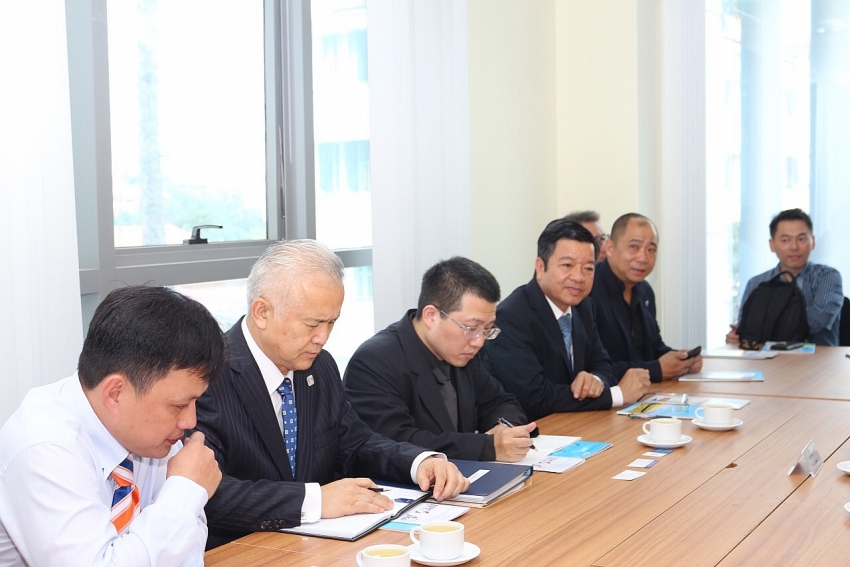Japanese Fuki Sangyo proposes high-tech waste treatment project
According to Toyonori Nishimura, president of Fuki Sangyo Group in Japan, garbage can be a kind of resource by the use of modern technology.
“This technology, if applied in Vietnam, will bring benefits to both the people and the economy as the investment costs are reasonable,” said Nishimura.
 |
| Fuki Sangyo proposed a $30 million high-tech project to Ho Chi Minh City |
Specifically, with the waste treatment technology of Fuki Sangyo, garbage from convenience stores and supermarkets can be recycled into animal feed and fertiliser within 24 hours, waste from bread and bran cake into food for pigs, and synthetic waste converted into energy, fertiliser or recycled materials. Similarly, waste from manufacturing brewers can be recycled into liquid food or dried into flour.
With this waste treatment system, tonnes of dead pigs, cows and chicken can be processed into bio-fertilisers and auxiliary energy, while waste from tea and coffee leaves can also be recycled into animal feed, fertilizer, and energy.
"The investment cost for such a plant is about $30 million and the technology is ready and can be installed right away," Nishimura proposed.
Commenting on this proposal, Tu Minh Thien, deputy head of the Management Board of Hi-Tech Park of Ho Chi Minh City, said that Fuki Sangyo's technology has many advantages and will bring many benefits at very reasonable costs.
Meanwhile, Nguyen Van Dung, chairman of Bao Thu Industrial Development and Investment JSC—the Vietnamese partner of Fuki Sangyo—remarked that technology could be very useful for Vietnam's agriculture.
“If this technology is applied, the waste disposal of the whole city need no longer be centred at one large location, but can be moved to each district to several smaller waste plants,” Dung said.
According to Dung, Fuki Sangyo and his company are implementing steps to set up such plants in Vietnam, first in Ho Chi Minh City, Dong Nai and Kien Giang provinces.
High-tech urban agriculture has been identified by Ho Chi Minh City authorities as the main direction of the city's agricultural sector. High-technology from Japanese partners are receiving much attention from the city authorities.
Nguyen Thanh Phong, Chairman of the Ho Chi Minh City People's Committee, said that hi-tech agriculture is the development focus for Ho Chi Minh City in the coming time with the desire to become a centre for the distribution and research of agricultural products for the whole southern region.
Ho Chi Minh City has also approved the plan named “Training high-tech agricultural human resources in 2018-2020" with the target of forming and developing hi-tech agricultural human resources who can have in-depth knowledge and experiences in applying research, managing, and transferring skills in agriculture development.
According to this plan, there will be nearly 3,000 agricultural workers trained during this period so that they can participate in each step of the production chain when applying hi-tech agriculture. 20 other post graduates and doctors will also be educated in applying high-technology inside and outside of Vietnam.
What the stars mean:
★ Poor ★ ★ Promising ★★★ Good ★★★★ Very good ★★★★★ Exceptional
Related Contents
Latest News
More News
- Vietnamese businesses diversify amid global trade shifts (February 03, 2026 | 17:18)
- Consumer finance sector posts sharp profit growth (February 03, 2026 | 13:05)
- Vietnam and US to launch sixth trade negotiation round (January 30, 2026 | 15:19)
- NAB Innovation Centre underscores Vietnam’s appeal for tech investment (January 30, 2026 | 11:16)
- Vietnam moves towards market-based fuel management with E10 rollout (January 30, 2026 | 11:10)
- Vietnam startup funding enters a period of capital reset (January 30, 2026 | 11:06)
- Vietnam strengthens public debt management with World Bank and IMF (January 30, 2026 | 11:00)
- PM inspects APEC 2027 project progress in An Giang province (January 29, 2026 | 09:00)
- Vietnam among the world’s top 15 trading nations (January 28, 2026 | 17:12)
- Vietnam accelerates preparations for arbitration centre linked to new financial hub (January 28, 2026 | 17:09)

 Tag:
Tag:























 Mobile Version
Mobile Version